Key takeaways:
- Effective assessment of tasks shifts focus from chaos to manageable challenges, prioritizing urgent and impactful work.
- Clear and proactive communication with stakeholders fosters trust and alleviates anxiety during last-minute jobs.
- Learning from experiences and implementing preventive strategies, such as proactive planning and setting boundaries, reduces the likelihood of future last-minute jobs.
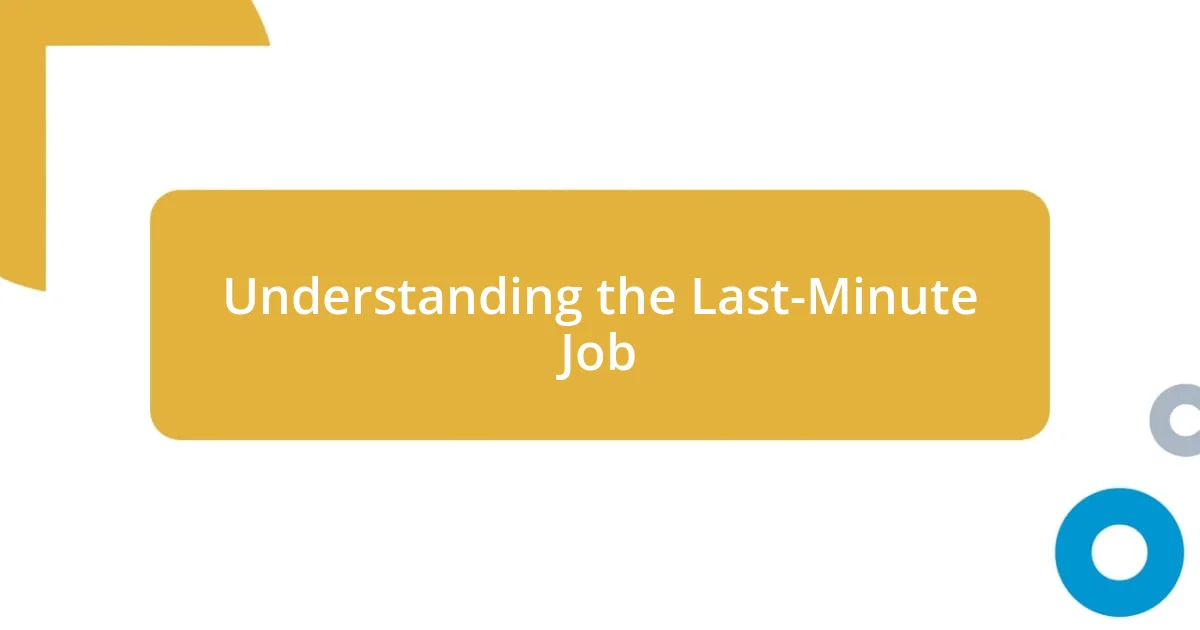
Understanding the Last-Minute Job
Last-minute jobs often arise unexpectedly, turning a calm day into a whirlwind of activity. I remember a time when a client called me just two days before an important presentation. The sheer panic in their voice was palpable, and it struck me how crucial it is to stay flexible and ready for whatever comes your way.
The pressure of a rapidly approaching deadline can be both exhilarating and overwhelming. I felt a rush of adrenaline as I plotted out a strategy to tackle the urgent tasks at hand. Have you ever found yourself in a situation where time was of the essence, and you had to dig deep to deliver? That experience taught me not just about prioritizing tasks but also about the importance of remaining calm under pressure.
Understanding the dynamics of a last-minute job involves recognizing the emotional rollercoaster it can provoke. It’s easy to feel stressed, but I realized that viewing the challenge as an opportunity to showcase my skills made a significant difference. Isn’t it interesting how the most stressful moments can sometimes lead to our most creative solutions?
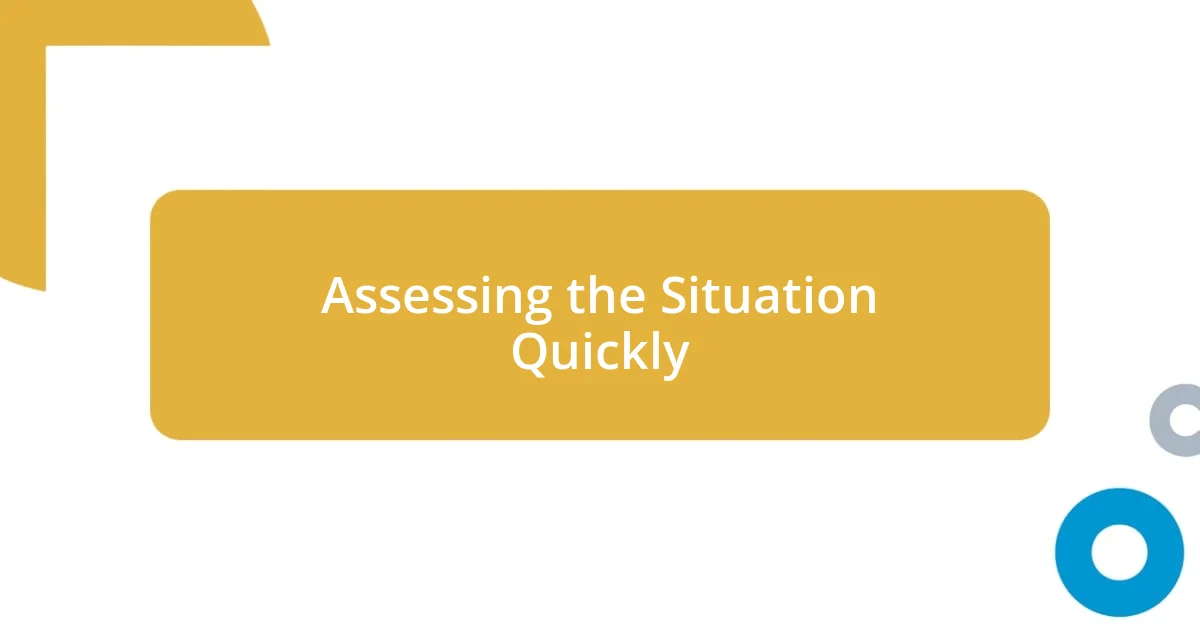
Assessing the Situation Quickly
When I found myself facing a sudden project, my first step was to quickly assess what needed immediate attention. I took a deep breath, visualizing the entire task ahead of me, while breaking it down into smaller, manageable parts. This mindset allowed me to view each element not as overwhelming but as a series of individual challenges. It’s fascinating how this approach can shift the narrative from chaos to strategy, isn’t it?
One specific instance stands out: I was enlisted to create a detailed report in mere hours. As I scanned through the materials, I instinctively prioritized the sections that would resonate most with the audience. By identifying key themes and potential gaps—like how critical data would impact decisions—I felt a surge of clarity. In moments like these, it’s really about context; knowing what’s essential helps you to respond more effectively.
Now, let’s put that thought process into perspective with a quick comparison of what it means to assess effectively versus feeling overwhelmed during such situations.
| Effective Assessment | Feeling Overwhelmed |
|---|---|
| Breaks tasks into manageable parts | Sees tasks as a monolithic challenge |
| Prioritizes based on urgency and impact | Gets caught up in insignificant details |
| Maintains a clear head for decision-making | Succumbs to panic and pressure |
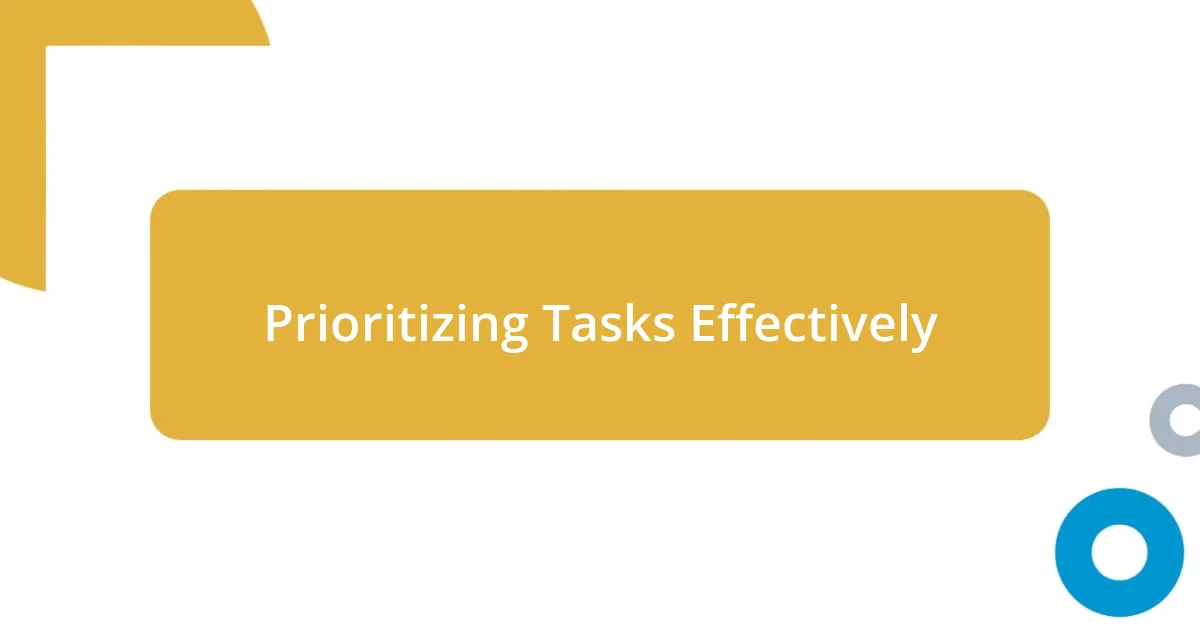
Prioritizing Tasks Effectively
When a last-minute job lands on your desk, effectively prioritizing tasks becomes your lifeline. I’ve had moments where I had to juggle multiple deadlines within hours. During one particularly hectic afternoon, I quickly whipped out a notepad and listed each task based on urgency and potential impact. This simple act transformed the chaos into a manageable strategy, allowing me to focus on what really mattered.
- Identify your top three priorities: Ask yourself, which tasks must absolutely be completed first?
- Consider the impact: Evaluate how each task contributes to the overall goal, and prioritize those with the biggest effect.
- Set time limits: Allocate specific time blocks for each task to keep yourself on track and prevent any procrastination.
- Stay flexible: Be ready to adjust your priorities as new information arises or situations change.
In my experience, creating this list not only helped clarify my focus, but it also alleviated some of the tension I felt, making the workload seem less daunting. The power of prioritization is truly transformative; it allows you to regain control over your day.
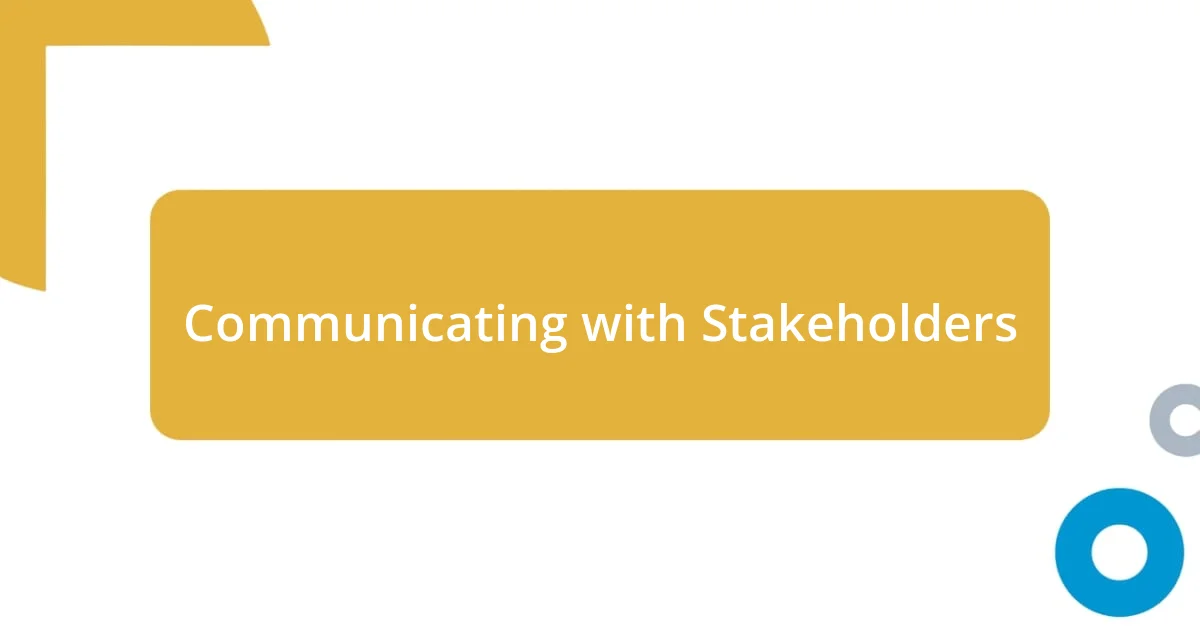
Communicating with Stakeholders
When communicating with stakeholders during a last-minute job, clarity is key. I remember a time when I had to inform my team about sudden changes in the project scope. My heart raced as I grabbed the phone to call everyone. Yet, I focused on being direct and transparent about the new requirements. It was essential to ensure everyone was on the same page, don’t you think? By providing precise information, I could alleviate some of the anxiety that comes with unexpected tasks.
In another instance, I found myself needing to keep a client updated without overwhelming them with details. I crafted a simple email that outlined the status and what they could expect moving forward, using bullet points for easier digestion. The joy I felt when they responded with appreciation was undeniable. They valued that I kept them informed without inundating them with too much information. Have you ever found that striking a balance in communication can make all the difference?
It’s remarkable how ongoing communication facilitates trust. For me, following up regularly reinforced a sense of partnership. One difficult moment arose when a delay occurred; I took the initiative to reach out with updates, taking the responsibility for the setbacks. In return, I received understanding and support rather than frustration. This experience solidified my belief that proactive communication not only aids in managing expectations but also fosters a collaborative environment.
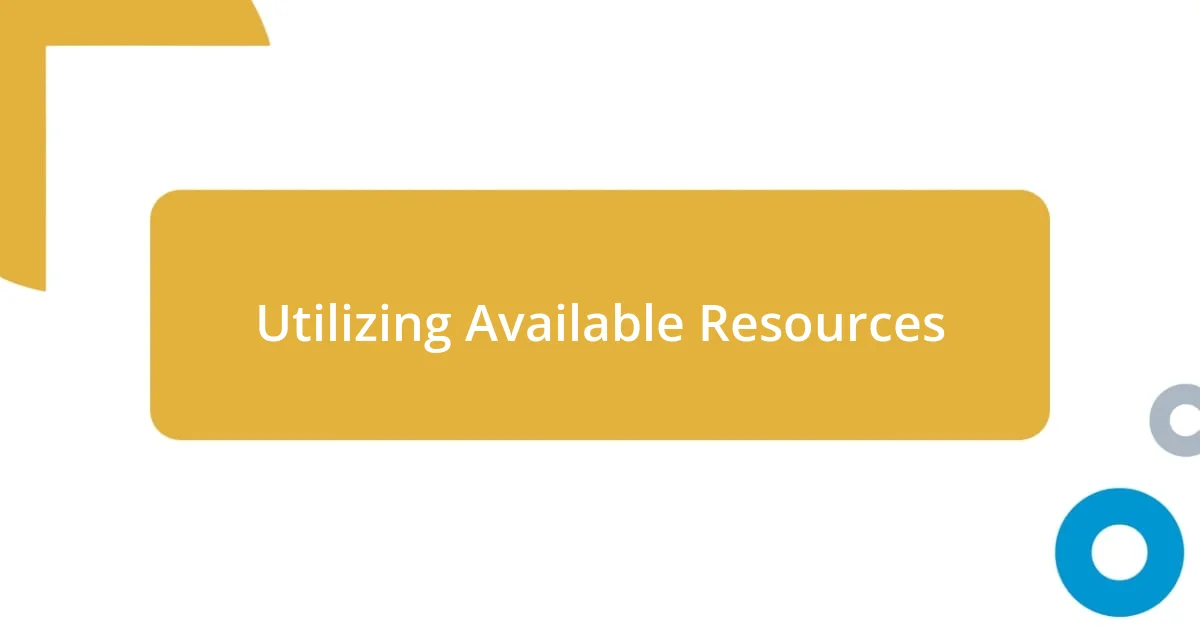
Utilizing Available Resources
When it comes to handling a last-minute job, tapping into available resources can be a game changer. I vividly remember one particularly stressful project where I felt overwhelmed. Instead of trying to tackle everything alone, I reached out to my colleagues for support. By seeking their expertise and ideas, I transformed a mountain of tasks into a team effort, which not only lightened my load but also fostered camaraderie. Isn’t it amazing how a little teamwork can alleviate pressure?
In addition to human resources, I’ve learned to leverage tools and technologies effectively. During one occasion, a close deadline forced me to turn to project management software I had previously underutilized. This allowed me to visualize my tasks and deadlines in real time. I could track progress quickly and identify bottlenecks before they became issues. Have you ever noticed how a simple tool can streamline your workflow in a huge way? It’s a real eye-opener!
Ultimately, it’s essential to keep an open mind about the resources at your disposal. I once found a creative solution through an old mentor’s advice—he suggested using a template for reports that I had previously overlooked. Not only did this save me countless hours, but it also improved the quality of my work. In those frantic moments, taking a step back to reassess what’s around you can reveal hidden gems of assistance that you might never think to explore.
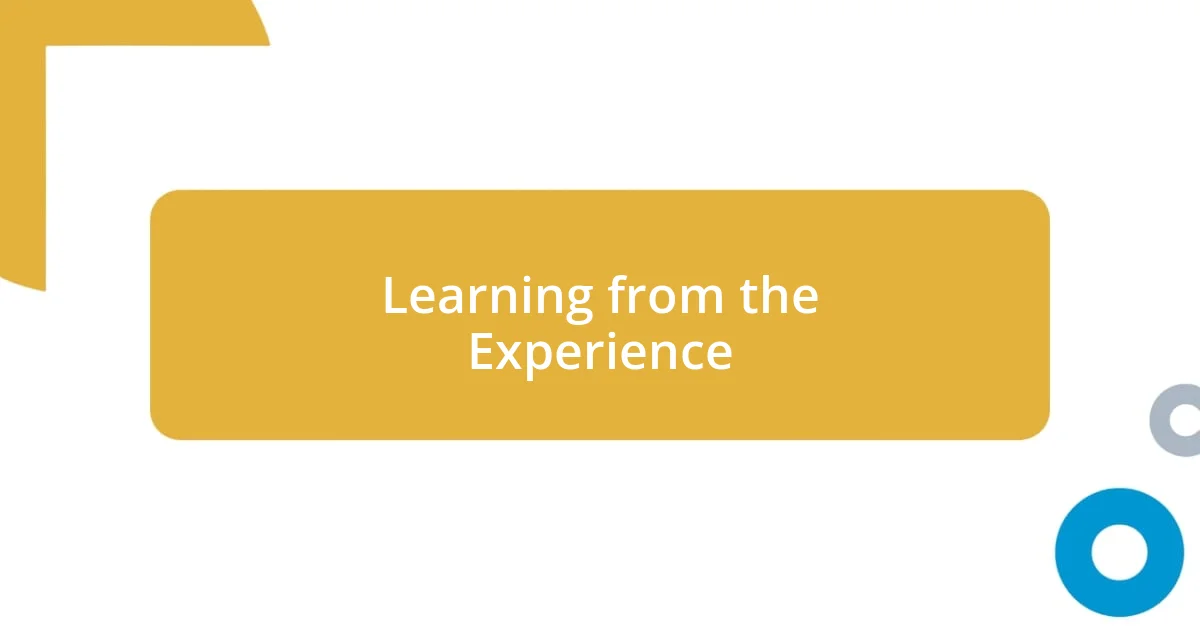
Learning from the Experience
Learning from each experience is an invaluable part of any last-minute job. One time, I found myself racing against the clock with a project that needed significant revision. Instead of feeling defeated, I took a moment to reflect on what went wrong in my initial approach. This self-analysis not only helped me improve that particular task but also shaped my future projects. Isn’t it interesting how setbacks often pave the way for our biggest growth moments?
During another last-minute scramble, I realized the importance of having a dependable checklist. While frantically pulling everything together, I created a checklist that included all the steps I took to resolve issues. This not only kept me organized in that moment but became a lifelong resource for me. Now, every time I face a similar situation, I lean on that checklist to ensure I cover all bases. It’s funny how something so simple can save you from chaos, isn’t it?
I’ve also found that sharing these experiences with others opens the door to collective wisdom. After a particularly rushed job, I started a casual lunch group with colleagues to discuss our toughest projects. Sharing our stories not only fosters camaraderie but reveals strategies we might not have considered on our own. I walk away from each meeting feeling inspired and equipped with fresh insights. It’s wonderfully reassuring to know that we’re all navigating the same challenges together, don’t you think?
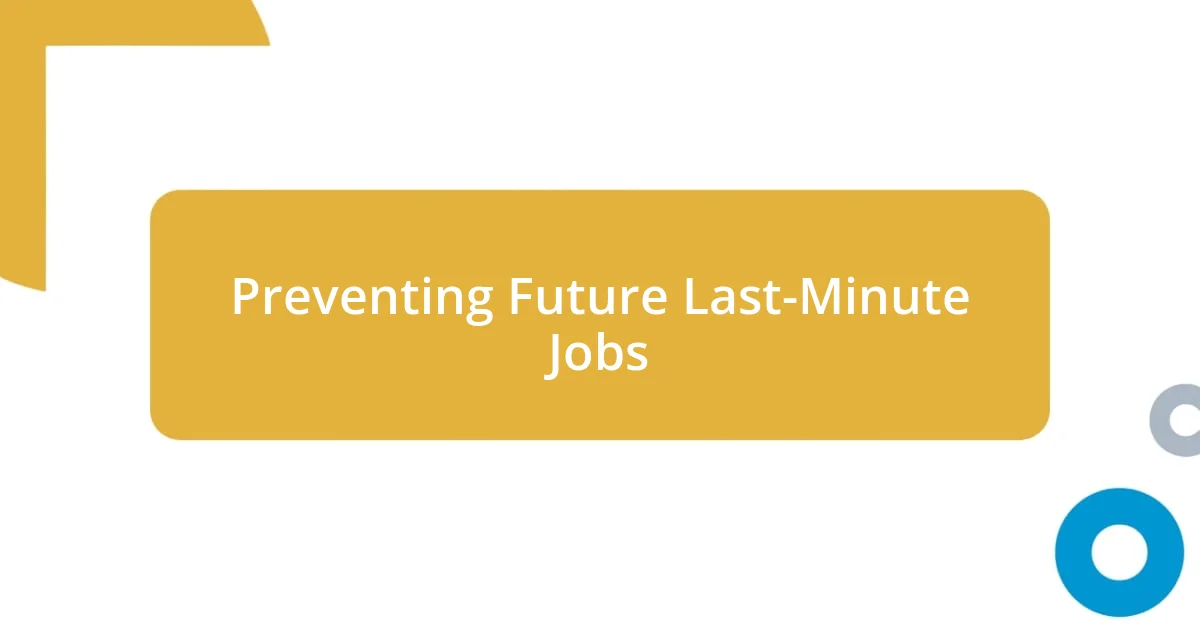
Preventing Future Last-Minute Jobs
One of the most effective ways I’ve found to prevent last-minute jobs is through proactive planning. I remember a time when I implemented regular check-ins for ongoing projects. By scheduling weekly meetings with my team, we stayed aligned on deadlines and scope, which minimized surprises down the road. It really made me realize that a little foresight goes a long way—wouldn’t you agree that keeping communication open can save a lot of headaches?
Another strategy that changed my approach was creating a buffer in my deadlines. Once, I was given a project with an overly tight schedule, and it taught me that unrealistic timelines can lead to chaos. Now, if I can, I always aim to finish tasks a few days early. This cushion not only eases my stress but also provides room for unexpected changes. Have you ever noticed how allowing a bit of extra time can transform how you handle deadlines?
Lastly, I’ve learned the importance of saying “no” when necessary. While it’s tempting to take on every request, I’ve found that overcommitting often leads back to frantic last-minute efforts. During a particularly hectic period, I accepted a job that I later realized clashed with my priorities. The fallout made me reflect on my boundaries, and now, I’m much more selective. Isn’t it freeing to understand that protecting your time is crucial for maintaining quality work and peace of mind?














